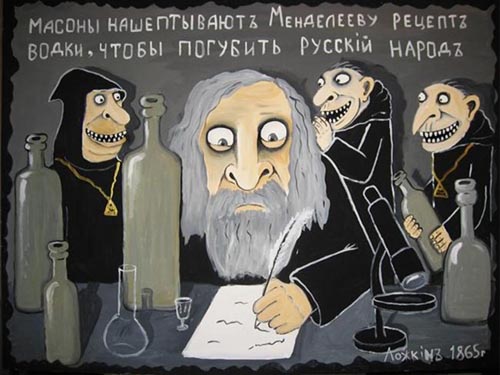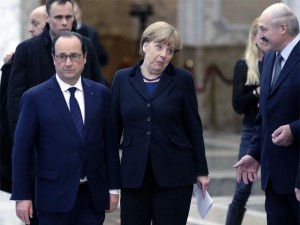Poland and Germany were both initiators and drivers of a New Eastern policy linked to the Eastern neighborhood and Russia/Soviet Union.
Uladzimir Matskevich: Belarus can be viewed as an experimental ground for Federal Security Service of the Russia

All kinds of movements were tried out at the Belarusan territory, which after successful tests were taken over by Russia.
On March 26 at the session of Federal Security Service (FSB) Vladimir Putin announced the “disclosure” of anti-Russian conspiracy prepared by the West. According to his data, “actions for the forthcoming election campaigns of 2016 and 2018 are being organized.” The main conspirators, according to the Russian president, are Russian NGOs. “Western intelligent services don’t stop their attempts to use public non-government organizations and politicized unions in their own purposes, first of all, to discredit the authorities and destabilize inner situation in Russia,” claimed Putin. And that is why Russia will be suppressing actions of “those, who work by external request, in the interest of foreign country or countries.”
This rhetoric isn’t new for Belarus — we went through this in the mid 1990s.
What is hidden behind the search for external and internal enemies of Russia? Uladzimir Matskevich, the head of the Board of the International Consortium “EuroBelarus“, answers the questions of EuroBelarus Information Service.
— Putin blamed the West in “destabilization of internal situation in Russia” and is using public non-governmental organizations for that purpose. What is hidden behind these accusations? Is it an attempt to consolidate pro-Putin majority in the face of danger of “internal and external enemy”?
— The rhetoric is not new. All dictatorships earlier or later come to the need to assign a new enemy. Gradually, with accumulation of internal problems, the number of internal and external enemies is increasing, so that the country is found “in the collar of enemies”. In this case the state can turn the screws and suppress any discontent.
This is well-trodden tactics of dictators.
Problems inside Russia started with the Russia-Ukraine war. Before the war Russian NGOs came to be registered as foreign agents. These were univocal attempts to distract society from inner-Russian problems.
Russia had to displace its hostilities in Donbas, which is non-success of the military operation. This non-success of special operation in Ukraine will lead to the situation when Russian society will recollect inner problems.
Search for enemies, forecasts of conspiracies and provocations distracts the attention of the society from the problems that the Putin’s regime has lead Russia to.
— Kremlin is going to take under control foreign sources of NGO’s funding and compare their authorized goals with their practical work. Has the competition for turning the screws started?
— Assault on civil society organizations started few years ago, and mainly affected human rights organizations aimed at civic freedoms and at participation in public campaigns. These organizations were declared “foreign agents”. They were made to register as “foreign agents”. It is very hard to find the reason to close a civil society organization; that is why Kremlin made such move.
Similar actions Alexander Lukashenko made in 1996-1997, when reregistration of NGOs was announced, Soros Foundation that was mainly funding humanitarian sciences was expelled from the country since it presented threat for Lukashenko. Putin is repeating Lukashenko’s move after more than a decade.
After the start of the Russia-Ukraine war the West was having difficulties with getting used to Russia in the role of an aggressor. Since dissolution of the Soviet Union Western countries looked upon Russia as a country in the transformation process. The West invested big money in Russia — funding of the country’s modernization largely exceeded the help of the West to NGOs. It is ridiculous to say that Western money went for Russia’s disruption through NGO’s, as the volume of funding is incommensurable.
Sadly though traditionally for Russia, the money for modernization were plundered, so Russia didn’t reach any particular economic successes; certain successes happened, but they are only related to the rent of minerals.
That is why Kremlin’s regime has to think of not only external, but also internal enemies. Russia is restoring Stalin’s internal and foreign policy.
— Lukashenko burnt out Belarusan inner political space with similar methods 10 years ago. Is Putin trying to provide itself with its own political longevity with Lukashenko’s methods?
— We need to dig into the history of Belarus-Russia relations.
No matter how perverted Lukashenko and his ideological and administrative apparatus are, Lukashenko has always acted and conducted his own policy according to scenarios of Russian intelligent services and FSB. And in 1994 Lukashenko won only with colossal support of Russia’s political and economic support and managed to escape impeachment in 1996 only with direct Russia’s involvement. We can say that Lukashenko’s regime survives only thanks to Kremlin’s economic and political support, adjusting and conducting its policy with the FSB.
Different kinds of movements — political, economic, ideological, were tried out at the Belarusan experimental area, and if proved to be successful, Russia adopted these movements from Belarus. Belarus can be viewed as an experimental ground for FSB, which is the main Kremlin’s brain centre. Indeed, first these methods were tried out at the Belarusan territory, which after successful “tests” were taken over by Russia.
Others
-
Uladzimir Matskevich: The sooner the "Union State" is denounced, the better for Belarus
Not only does the “Union State” undermine the establishment of civilized relations with Europe, but it hinders the possibility of normal relations between Belarus and Russia.
-
Uladzimir Matskevich: The regime can no longer control the situation in the country
The authorities are unable to prolong the social contract with the people: there is no way out of the social crisis.
-
Press release of the BNP in connection with the next round of the dialogue in the format of the EU-Belarus Coordination Group
Belarusan National Platform of the Eastern Partnership Civil Society Forum welcomes the dialogue process in the format of the EU-Belarus Coordination Group, the third round of which was held in Minsk on 3-4 April 2017.
-
Hennadiy Maksak: Europe must react adequately to the events in Minsk
A new wave of political repressions should make the EU return to tougher policy towards the Belarusan regime.








Comments
From farewell to a new Eastern policy and towards a new development
Poland and Germany were both initiators and drivers of a New Eastern policy linked to the Eastern neighborhood and Russia/Soviet Union.